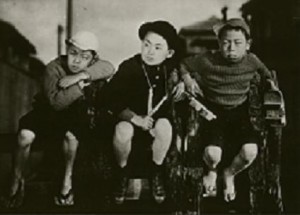 By the time Yasujiro Ozu made I Was Born, But… in 1932, he’d already directed more than 20 movies in only five years. Although he went on to make lots of other notable films over the next three decades–Late Spring, Tokyo Story and Floating Weeds are some of the most discussed films ever, as is his swan song An Autumn Afternoon–I Was Born, But… has a special place in his career, for it was the turning point that signaled his maturity as an artist, and it is a landmark in the filmography of one of the greatest directors of all time.
By the time Yasujiro Ozu made I Was Born, But… in 1932, he’d already directed more than 20 movies in only five years. Although he went on to make lots of other notable films over the next three decades–Late Spring, Tokyo Story and Floating Weeds are some of the most discussed films ever, as is his swan song An Autumn Afternoon–I Was Born, But… has a special place in his career, for it was the turning point that signaled his maturity as an artist, and it is a landmark in the filmography of one of the greatest directors of all time.
In that light, people who might be unfamiliar with Ozu’s work and want to have a look would probably start there. They’ll have an opportunity to do so over the next two weeks, when it will be playing at IFC Center in New York. Anybody who’s pining for a movie-going experience this weekend that’s more rewarding than Grown Ups and Knight and Day might want to check it out.
“It’s a film we love, a great, great movie that we think not enough moviegoers have had a chance to see,†said Harris Dew, the director of programs and promotions at IFC Center. “It’s a completely accessible, smart and very funny film that tells a universal story about children and parents.â€
The film–a silent comedy centered on two kids whose dad says they should stand up to bullies at school, and what happens when they find out what a pushover he is at the office–takes a look at the makings of a modern family, a subject Ozu revisited over and over again throughout his career.
Aaron Gerow, an associate professor who runs a doctoral program in East Asian cinema at Yale University, said films like I Was Born, But… are a sign of how greatly changing times disturbed him.
“A Japan entering modern capitalist, consumer modernity, becoming more and more Western, was a constant concern for him,†he said. “There is a repeated theme of the family breaking up or suffering under the pressure of these larger changes. Generation gaps and conflicts often appear in his films, and the family is a crucible for such changes.â€
It’s hard to approach the same subject at different angles, but Gerow said that by doing so, Ozu gave the world a sense of who he was. “[Critic David] Bordwell argues that Ozu’s world is a single large story, and his individual films are just combinations of various modules in that story,†Gerow said.
While it’s true that Ozu made other films that explored similar themes (he remade this one in 1959 as Good Morning, in fact), the fact that he made I Was Born, But… in the formative years of his career allows one to see how his career was highly changed by this film.
As mature a triumph as I Was Born, But… was, Ozu still found room for growth.
This article originally appeared on AllMediaNY.com

Leave a Reply